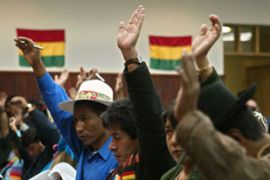Bolivia assembly backs constitution
Charter would hand more power to the country’s indigenous population.

Seven delegates from the National Unity party were almost the only opposition presence.
Hundreds of changes
More than 400 changes to the constitution were approved on Sunday.
| “We’re coming to a happy ending, we’re managing to approve the new constitution the Bolivian people are asking for” Roman Loayza, Movement Toward Socialism party |
After that article has been approved, the assembly will vote again, before another referendum is required on the full constitution.
Roman Loayza, head of the MAS delegates in the assembly, said: “We’re coming to a happy ending. We’re managing to approve the new constitution the Bolivian people are asking for.”
Three people died in protests after the vote causing Sunday’s assembly to be moved to Oruro, 230km south of La Paz.
Miners guard session
Miners loyal to Morales guarded the university auditorium where the session was being held, exploding small dynamite charges occasionally to intimidate any potential anti-assembly protesters.
Morales says that the changes will redress centuries of discrimination by a political class dominated by a European-descended elite.
It will hand 62 per cent of the population more control of their traditional lands and turn the bicameral legislature into a one-house body.
Morales became Bolivia’s first leader of indigenous descent in January 2006, ending the political dominance of a mainly white economic elite.